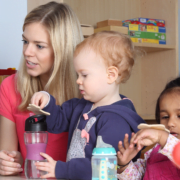Social interaction is one of the most important aspects of any child’s development. The benefits will have a lifelong effect on the child and by making sure that they are given a chance for social interaction early, it is ensured that the child will have a solid foundation for their social skills as they grow and eventually become an adult. By using a child care service which encourages social interaction early on a child can gain the following benefits:
Learning to Work with Others
Teamwork is a skill that will be useful throughout life, and it is founded on the principles of sharing, communicating, compromising, and working towards common goals. As children play together in supervised learning environments such as child care, they will begin to understand the appropriate tactics for working well with others.
Developing Communication Skills with Child Care
While early communication skills are developed by imitating adults, children also need to learn to communicate verbally with peers. Social interaction from an early age is a key factor in learning to speak effectively for clear communication. Through communication with others at places like child care, kids also gain a sense of self and learn to identify as individuals, which is a normal part of the developmental process for toddlers.
Understanding Social Cues
Non-verbal communication is another important component of social interaction for children. As kids play and learn together, they will begin to understand emotions expressed through facial expressions and body language. Not only will this be valuable in knowing what others are feeling, but it is also helpful for children who are just learning to express themselves.
Building friendships
Friendships are critical for young children, and they are only built through regular social interactions. Because children do not have innate problem solving and conflict resolution skills at young ages, guided social interactions are helpful in forging friendships that will be necessary for building confidence and self-esteem.
Should all children be given the same amount of social interaction?
Things aren’t always so simple. Just as in the adult world no two children are the same. They will all have different levels of comfort as well as enjoyment in how they handle social situations. Children who are more introverted for example may benefit and get more enjoyment from less social interaction than other children. They may find it more comfortable to only have 2 or 3 close friends rather than being part of a larger group. On the other hand, children who are more extroverted may enjoy being around their peers for longer periods of time and may enjoy themselves more in a bigger group. Additionally, it is also important to consider the needs of children who may have a mental health condition such as autism spectrum disorder. These children may have a very tough time in social situations and additional care should be given in assisting these children to allow them to interact with others in a way that still allows them to feel safe and comfortable.



